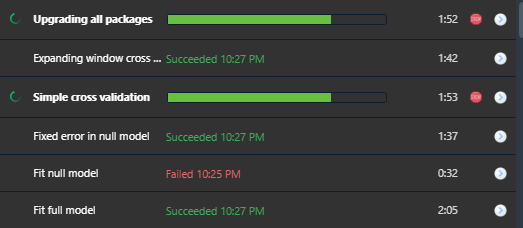Use job::job() to run chunks of R code in an RStudio job instead of the console. This frees your console while the job(s) go brrrrr in the background. By default, the result is returned to the global environment when the job completes.
Install:
remotes::install_github("lindeloev/job")Write your script as usual. Then wrap parts of it using job::job({<your code>}) to run that chunk as a job:
job::job(my_result = {
foo = 10
bar = rnorm(5)
})When the job completes, it silently saves my_result (or whatever you called it) to your environment. my_result is itself an environment() and behaves much like a list():
Here is a real-world use case: We all love brms but compilation and sampling takes time. Let's run it as a job!
library(brms)
data = mtcars[mtcars$hp > 100, ]
model = mpg ~ hp * wt
# Send long-running code to a job
job::job(brm_result = {
fit = brm(model, data)
fit = add_criterion(fit, "loo")
print(summary(fit)) # Show a summary in the job
the_test = hypothesis(fit, "hp > 0")
})
cat("I'm free now! Thank you.
Sincerely, Console.")Now you can follow the progress in the jobs pane and your console is free. brm_result will eventually be returned.
Often, the results of the long-running chunks are the most interesting. But they easily get buried among the other outputs in the console and are eventually lost due to the line limit. RStudio's jobs history can be used as a nice record. Make sure to print informative results within the job and give your jobs an appropriate title, e.g., (job::job({<code here>}, title = "Unit test: first attempt at feature X").
RStudio jobs spin up a new session, i.e., a new environment. By default, job::job() will make this environment identical to your current one. But you can fine control this:
-
import: by default, all objects are loaded into the job. Control this usingjob::job({}, import = c(model, data)), e.g., if you have a big global environment. Setimport = NULLto import nothing. -
packages: by default, all attached packages are attached in the job. Control this usingjob::job({}, packages = c("brms"))or setpackages = NULLto load nothing. Ifbrmsis not loaded in your current session, addinglibrary("brms")to the job code may be more readable than attaching via thepackagesargument. -
options: by default, all options are overwritten/inserted to the job. Control this using, e.g.,job::job({}, opts = list(mc.cores = 2)or setopts = NULLto use default options. If you want to set job-specific options, addingoptions(mc.cores = 2)to the job code may be more readable than setting via theoptsargument. -
export: in the example above, we assigned the job environment tobrm_resultupon completion. Naturally, you can choose any name, e.g.,job::job(fancy_name = {a = 5}). To return nothing, simply omit the name (job::job({a = 5}). Returning nothing is useful when-
your main result is a text output or a file on the disk, or
-
when the return is a very large object. The underlying
rstudioapi::jobRunScript()is slow in the back-transfer so it's faster tosaveRDS(obj, filename)them in the job andreadRDS(filename)into your current session.
-
- Model training, cross validation, or hyperparameter tuning: train multiple models simultaneously, each in their own job. If one fails, the others continue.
- Heavy I/O tasks, like processing large files. Save the results to disk and return nothing.
- Run unit tests and other code in an empty environment. By default,
devtools::test()runs in the current environment, including manually defined variables (e.g., from the last test-run) and attached packages. Calljob::job({devtools::test()}, import = NULL, packages = NULL, opts = NULL)to run the test in complete isolation. - Upgrading packages
job::job() is aimed at easing interactive development within RStudio. For larger problems, production code, and solutions that work outside of RStudio, check out:
-
The
futurepackage's%<-operator combined withplan(multisession). -
The
callrpackage is a general tool to run code in new R sessions.

